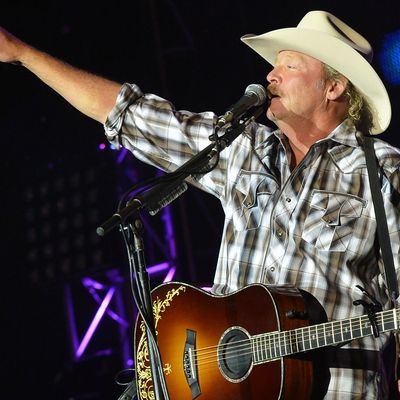
If Alan Jackson has ever broken a sweat, heÔÇÖs never done it in a recording studio. Jackson, 55, is one of the biggest country stars of the past quarter century. HeÔÇÖs definitely the most relaxed. He delivers his songs in an easygoing baritone, rarely raising his voice, no matter what heÔÇÖs singing: party-hearty honkytonk tunes, old-fashioned weepers, duets with Jimmy Buffett, novelty songs about carpetbagging country singers, the maudlin 9/11 ballad ÔÇ£Where Were You (When the World Stopped Turning).ÔÇØ HeÔÇÖs an imposing man: six-foot-four, broad-shouldered, with a thick blond mustache that looks like itÔÇÖs been edged with a combine harvester. But onstage, heÔÇÖs languid, planting himself in front of a microphone and letting the songs glide out. The laid-back style sets a listener at ease: An Alan Jackson song is an invitation to put your feet up. Some musicians have name-brand fragrances or headphones. Jackson has a rocking chair, the Cracker Barrel Alan Jackson Signature Rocker.
JacksonÔÇÖs nonchalance is a technique, and a technique-masker. His notes twirl and float with classic country swing ÔÇö swing so subtle, you sometimes barely notice that Jackson is singing at all. The goal is to make singing sound as natural as speech, a crucial deception in a genre that prizes naturalism and storytelling. That vocal style doubles as a character portrait: the voice of the archetypal country music male, the strong (or secretly weak) silent type, a stoical manÔÇÖs-man who hides his deep feelings beneath a gruff exterior and a twelve-gallon Stetson. The master of the form was George Jones, and though mainstream country long ago abandoned Jonesism, Jackson still carries the torch. At JonesÔÇÖs funeral in May, Jackson was tasked with┬ásinging the great manÔÇÖs most famous song, ÔÇ£He Stopped Loving Her Today.ÔÇØ The result was a triumph of restraint, proof that an understated performance can level you like a middle-linebackerÔÇÖs open-field tackle.
Last night, Jackson played Carnegie Hall. IÔÇÖd been looking forward to the show for weeks, but life intervened and, at the last minute, I had to skip it. (That high lonesome wail you heard at 8 p.m. yesterday was not the baying of a coonhound.) IÔÇÖve seen Jackson before, but I was eager to check out the current tour, in support of his┬álively new collection of bluegrass songs. For two decades, Jackson was one of the biggest hit-makers in any genre. (The Recording Industry Association of America ranks Jackson 33rd on the list of┬áall-time top-selling artists, with 43.5 million albums sold.) But itÔÇÖs been four years and four albums since Jackson placed a single in the country top ten; heÔÇÖs unfashionable now, and it suits him. This year heÔÇÖs released two excellent, defiantly uncommercial long-players:┬áThe Bluegrass Album, and┬áPrecious Memories Volume II, a gospel record.
The Bluegrass Album┬áin particular is great fun. Unlike many roots music albums, itÔÇÖs not self-important or fusty. In fact, itÔÇÖs anti-nostalgic: Eight of its new songs are Jackson originals, and one of those, ÔÇ£Blacktop,ÔÇØ takes aim at pastoral sentimentality. ÔÇ£This ainÔÇÖt no song about the good olÔÇÖ days / Simpler times or easy ways,ÔÇØ Jackson sings. ÔÇ£I was glad to see the blacktop / When they laid it down in ÔÇÿ65 / I was glad to see the blacktop / No more dust in my eyes.ÔÇØ It sounds like bluegrass, all right ÔÇö a keening Appalachian tone has crept into JacksonÔÇÖs voice ÔÇö but he sings the way he always has: easefully, elegantly, with the artlessness that only an artist can muster.

